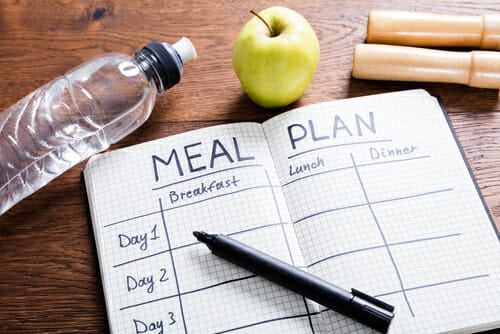How Many Meals a Day Do You Really Need?
 The debate about how much, and how often, to eat is an old one. Eating “three squares a day” has been the prevailing thought for many decades. Many so-called “gurus” of fitness and nutrition recommend we eat five to six smaller meals at more frequent intervals; the theory behind eating more often is that it speeds up our metabolism.
The debate about how much, and how often, to eat is an old one. Eating “three squares a day” has been the prevailing thought for many decades. Many so-called “gurus” of fitness and nutrition recommend we eat five to six smaller meals at more frequent intervals; the theory behind eating more often is that it speeds up our metabolism.
However, a number of registered dieticians counter that 2,000 calories is 2,000 calories, regardless of whether it’s divided among three meals or six. The body expends the same total energy in either case. A large number of studies also have cast doubt upon the idea that eating more frequently helps us lose weight. Many dieticians believe that eating more frequently only teaches us to be hungry all the time; many also caution that sometimes, more is more, not less. That is, if we’re not mindful of portion size, eating more frequently may simply increase our total caloric intake over the course of the day.
The modern prevailing thought is that most adults need just two meals a day – or three if we’re particularly active – followed by intermittent fasting. It’s a common belief that fasting puts the body into “starvation” mode, which actually causes us to gain weight, instead of losing it. Many studies dispute this theory, however. Short-term fasting increases metabolism initially; the so-called “starvation” mechanism, which slows metabolism and causes body to burn fat and muscle, only kicks in after two to three days of prolonged fasting.
In one school of thought on intermittent fasting, advocates say we should have only breakfast and dinner – or lunch and dinner – within an eight-hour period; we should then refrain from eating again until the following day. Other dieticians recommend eating three regular meals a day, with one to two 24-hour fasts per week. Studies on intermittent fasting have shown several health benefits, including lower glucose and insulin levels, as well as increased insulin sensitivity.
Still other dieticians say the best rule to follow in deciding how many meals a day to eat is to ask yourself: “Am I hungry?” If you’re hungry, eat; when you’re full, stop eating. It’s that simple.
When you are choosing a private residential treatment program, choose the program that focuses on personalized care, the greatest luxury accommodations, and has the highest accreditations. Harmony Place offers a full continuum of treatment options from detox to transitional living encouraging recovery for a lifetime. For a private consultation and more information, call us today: 1-855-652-9048
